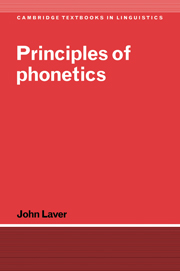Book contents
- Frontmatter
- Contents
- List of figures
- List of tables
- Preface
- Acknowledgements
- Introduction
- PART I General concepts
- PART II The analytic framework
- PART III Initiation and phonation
- PART IV Linear segmental analysis
- 8 Stop articulations
- 9 Fricative articulations
- 10 Resonant articulations
- 11 Multiple articulations
- PART V Articulatory co-ordination and phonetic settings
- PART VI Temporal, prosodic and metrical analysis
- PART VII Principles of transcription
- PART VIII Conclusion
- Envoi
- Appendix I The phonetic alphabet of the International Phonetic Association
- Appendix II Index of languages
- References
- Index of names
- Subject index
8 - Stop articulations
Published online by Cambridge University Press: 05 June 2012
- Frontmatter
- Contents
- List of figures
- List of tables
- Preface
- Acknowledgements
- Introduction
- PART I General concepts
- PART II The analytic framework
- PART III Initiation and phonation
- PART IV Linear segmental analysis
- 8 Stop articulations
- 9 Fricative articulations
- 10 Resonant articulations
- 11 Multiple articulations
- PART V Articulatory co-ordination and phonetic settings
- PART VI Temporal, prosodic and metrical analysis
- PART VII Principles of transcription
- PART VIII Conclusion
- Envoi
- Appendix I The phonetic alphabet of the International Phonetic Association
- Appendix II Index of languages
- References
- Index of names
- Subject index
Summary
A stop segment is defined as a segment whose medial phase is characterized by a stricture of complete oral closure made by the active articulator against the passive articulator. This prevents the escape of air from the mouth, and if a simultaneous velic closure is maintained so that the air cannot escape through the nasal cavity either, then under conditions of positive egressive pressure, the intra-oral pressure (i.e. the pressure of the air within the vocal tract) will rise. These conditions constitute the minimum requirements for the specification of a pulmonic egressive oral stop segment.
When the oral closure is released in the offset phase of an oral stop of this sort, the compressed air escapes to the atmosphere with a small but audible explosion, sometimes referred to in the acoustic phonetic literature as the stop burst. In the case of a pulmonic ingressive airstream, the intra-oral pressure of the volume of air which is sealed from the outside atmosphere by the oral and velic closures drops. When the seal is released, the higher-pressure air of the outside atmosphere implodes in to fill the relative vacuum in the vocal tract.
Stops, like other segment-types, have three phases. These all relate to the oral closure that characterizes the medial phase. The onset phase, as the articulatory transition towards complete closure, can be called the closing phase. The medial phase of a stop segment (from the moment full closure begins to the moment it ends) can be referred to as the closed phase.
- Type
- Chapter
- Information
- Principles of Phonetics , pp. 205 - 243Publisher: Cambridge University PressPrint publication year: 1994



